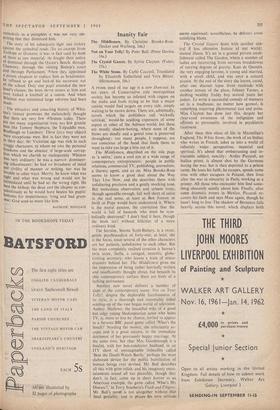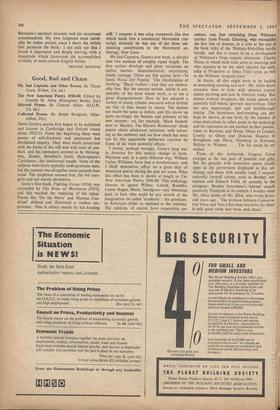Inanity Fair
A PRIME need of our age is a new Dunciad, In ten years of Conservative rule metropolitan society has become so infested with rogues on the make and fools trying to be that a major satirist would find targets on every side, simply waiting to be mown down. There are, admittedly, novels which the publishers call 'wickedly satirical,' would-be scathing exposures of sonic aspect or other of the Admass world, but these are mostly shadow-boxing, where none of the blows are deadly and a genial tone is preserved throughout: too many people, I suppose, are too conscious of the hand that feeds them to want to take too large a bite out of it.
The Middlemen, described on the title page as 'a satire,' casts a cool eye at a wide range of contemporary entrepreneurs: people in public relations, commercial TV, publishing, journalism, a literary agent, and so on. Miss Brooke-Rose seems to know a good deal about the Way They Live Now, and she describes them with unfaltering precision and a gently mocking tone. But meticulous observation and urbane irony, though agreeable enough, fall well short of satire in the real sense, at least as Ben Jonson or Swift or Pope would have understood it. Where is the moral passion, the conviction that the world is full of bastards who must be sym- bolically destroyed? I don't find it here, though the book isn't without felicities of a more ordinary kind.
The heroine, Serena Scott-Buttery, is a sweet, gentle psychoanalyst of forty-one; at least, she is the fools, since several of the other characters are her patients, unbeknown to each other. But the most completely realised creation is Serena's twin sister, Stella, a ravaged, neurotic, globe- trotting secretary, who leaves a train of minor disasters behind her. The Middlemen gives me the impression of being rather hurriedly written and insufficiently thought about, but beneath its chic contemporary surface there are hints of a lurking seriousness.
Another new novel delivers a number of slaps at the contemporary scene. Not on Your Telly!, despite the deplorable facetiousness of its style, is a thorough and reasonably lethal sending-up of the vast bogus world of television. Audrey Marlowe, the beautiful wife of a good but edgy young Shakespearian actor who hates TV, is, more or less by chance, invited to appear in a fatuous BBC panel game called 'What's the Smell?' Needing the money, she reluctantly ac- cepts and is a great success, to the immediate detriment of her previously happy marriage. At the same time, her char Mrs. Goodenough is a finalist, with her bus-conductor husband, in an ITV show of unimaginable imbecility called 'Beat the Death-Watch Beetle,' perhaps the most
elaborate device for the public humiliation of human beings ever devised. Mr. Bull describes all this with grim relish, and his imaginary enter- tainments sound all too plausible, though they don't, in fact, come up in sheer horror to an
American example, the game called 'What's My Disease?,' in Terry Southern's Flash and Filigree. Mr. Bull's novel is not altogether without that fatal geniality, and in places his own attitude
seems equivocal; nevertheless, he delivers some satisfying blasts.
The Crystal Gazers deals with another cen- tral if less obtrusive feature of our world: mental illness. It's set in a genteel private estab- lishment called The Garden, where a number of ladies are recovering from nervous breakdowns of varying degrees of gravity. Kate de Quentin, the very engaging heroine, is young and married, with a small child, and was once a concert pianist. At the end of the story she leaves, cured, after one discreet lapse from rectitude with another inmate of the place, Johnny Turner, a dashing wealthy Teddy boy several years her junior. To write a successful comedy of manners set in a madhouse, no matter how genteel, is something requiring phenomenal tact and poise. Miss Clayton has done just this, despite her clear-eyed awareness of the indignities and affronts to personality involved in psychiatric treatment.
After these thin slices of life in Macmillan's England, The White Stone, the work of an Italian who writes in French, 'takes us into a world of infinitely wider perspectives, material and spiritual. It's about that embarrassing and in- tractable subject, sanctity : Ardito Piccardi, an Italian priest, is almost shot by the Germans during the war, but is then deported to a prison camp. He loses his faith; he escapes, spends some time with other escapees in Poland, then lives after the war in obscurity in Paris, working as a printer. All those who encounter him find some- thing obscurely saintly about him. Finally, after some dramatic events in Mexico, Piccardi re- covers his faith and says Mass again, though he hasn't long to live. The shadow of Bernanos falls heavily across this novel, which displays both Bernanos's spiritual intensity and his occasional sensationalism. My own judgment must inevit- ably be rather partial, since 1 share the beliefs that permeate the book: 1 can only say that I found it impressive and deeply moving, with a magnitude which transcends the accomplished triviality of most current English fiction.
BERNARD BERGONZI



































 Previous page
Previous page